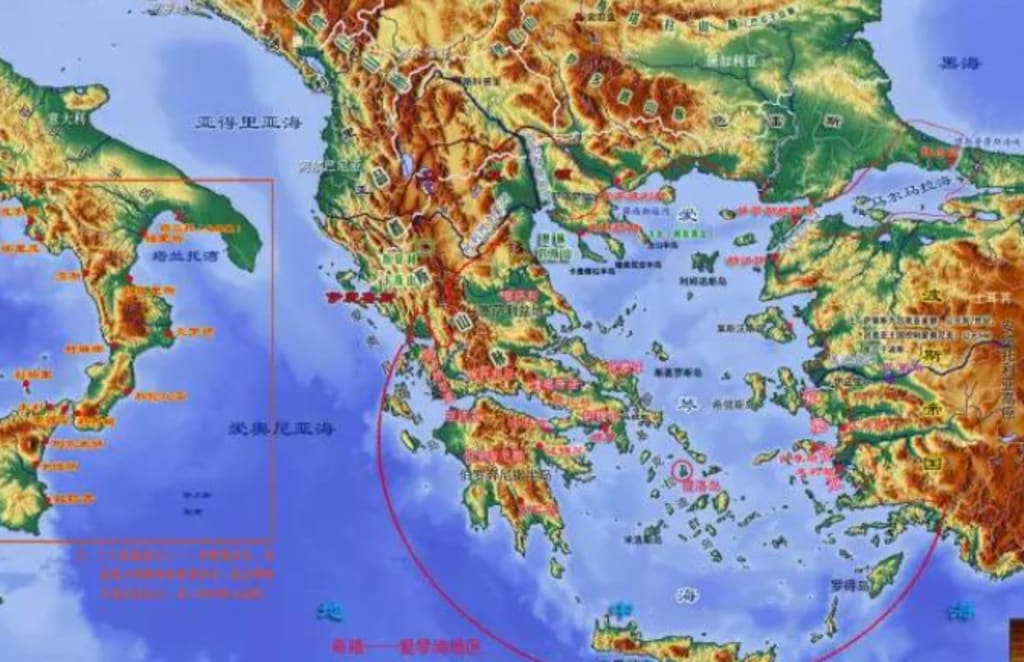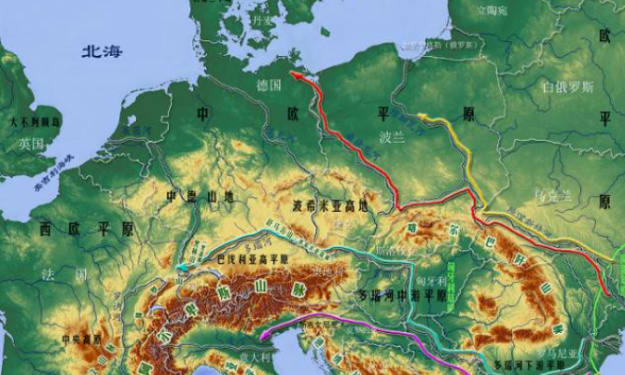Europe Series - The First Dark Ages of Ancient Greek Civilization
he First Dark Ages of Ancient Greek Civilization

Through the previous content, we have made it clear that the origin of Greek civilization and the Greeks lies in absorbing civilization factors from Cretan civilization, and finally achieving the "Mycenaean civilization" of its own civilization system. The Trojan War in the 12th century BC was a sign of these ancient Greeks controlling the Aegean Sea, and this time node can also be regarded as the peak of Mycenaean civilization.
In fact, the Trojan War is probably not a war, but a collection of wars between the Greek Peninsula and Asia Minor for control of the Aegean Sea. In view of the recording conditions at that time, the successors of the Mycenaean civilization, through word-of-mouth transmission of bards, added branches and leaves, and finally achieved the mythical "Homer Epic" with the Trojan War as the main line. This situation also exists in the popularization of folk historical knowledge in China. It seems that many people's knowledge of the Three Kingdoms and even the history of the Song Dynasty comes from the "Romance" of storytelling performers. If we didn't have enough history books today, maybe "Romance of the Three Kingdoms" would have the opportunity to become a history book. From a technical point of view, the credibility of Homer's epics is far less than those of Romance. However, considering the history of China's contemporaries, there are actually too many mythological elements, and we don't need to ask too much from the ancients.
In any case, Homer's epics have made a huge contribution to determining the origin of Greece and even Western civilization. The real historical information brought by the Trojan War has also been verified by archaeological discoveries. However, regardless of whether the person "Homer" really exists, the Mycenaean civilization has collapsed in the era of Homer's epic. This historical period (11th to 9th centuries BC), known as the "Homer Age", was also the first dark age in the history of Greek civilization.
We are more familiar with the dark ages in Western history, which should be after the collapse of the Roman Empire, the Middle Ages in Europe (the demise of Western Rome - the Age of Navigation; about the 5th century BC to the end of the 15th century). The invasion of the northern barbarians, represented by the Germans, was the geographical background of this dark age. As for the geographical background of the Homer era, it also originated from the barbarian invasion. The northern barbarians who destroyed the Mycenaean civilization were called "Dorians".
In the era of Mycenaean civilization, the people who dominated the Greek peninsula were called "Achaeans" (also translated Achaean, Achaean). In addition, there are ancient Greek tribes with similar blood and language to the Achaeans: Ionian (Ionian, also translated Ionian), Aeolian (Aeolian). If you want to look at the geopolitical structure of East Asia from a similar era. We can compare the Achaeans to the Zhou people from the Ji tribe, while the other two tribes are represented by the Jiang surname, and those Xirong tribes with close blood and political ties.
From the perspective of geographical relationship, the Achaeans were obviously the first to penetrate into the Peloponnesian Peninsula, and finally entered the age of civilization by virtue of their geographical advantage. After this, two of his kin tribes, the Ionians and the Aorians, also used peaceful means (such as marriage) to share the Mycenaean civilization with the Achaeans.
The victory of the Trojan War made the economy of the Mycenaean civilization focus more on maritime trade. The coastal area of the Asia Minor peninsula, which was originally controlled by the Trojans, also became the focus of colonization of the Mycenaean civilization. In the mainland of the Greek peninsula, the Ionians and Iorians, who belonged to the subordinate status, became the main force of overseas expansion.
However, not all tribes that speak ancient Greek are necessarily allies of the Achaeans. Just as we believe that the Qiang tribes on the Loess Plateau should have close kinship with the founder of the Chinese civilization, the fusion between the two is still accompanied by countless wars. In fact, the "Dorians" who eventually destroyed the Mycenaean civilization were also part of the ancient Greek tribes.
Compared with the Achaeans and their allies who focused on maritime trade and the development of maritime military power, the Dorians' advantage undoubtedly lies in land. As a result of the southward invasion of this northern mountain people (11th century BC), the city-states established by the Mycenaean civilization with the Peloponnese as the core and distributed in the southern part of the Greek peninsula were completely destroyed.
If the control of the Greek peninsula is handed over from the Achaeans to the civilized Ionians and Iorians, I believe that the ancient Greek civilization will not enter a dark age, but will enter a new civilization period. This kind of situation has also happened frequently in the history of the Middle Kingdom. However, also referring to the history of the Central Kingdom, we will also find that not every northern invader will naturally accept the Chinese way of life based on agricultural civilization. The empires founded by the Mongols, for example, clearly resisted this process (although in the end, most of these marginal peoples were eventually merged by higher civilizations).
The mentality of the Dorians should be similar to that of the later Mongolians. It's just that what they are resisting is not agricultural civilization. On the contrary, these "barbarians" who have entered the agricultural era in the northern mountains are staunch supporters of the concept of farming. What they were resisting was the "marine civilization" that the Mycenaean civilization relied on and centered on maritime trade.
Under the management of the Dorians, the Peloponnese began to enter a conservative agricultural era. In the eyes of Westerners, this lack of creativity and pioneering approach obviously made the development of ancient Greek civilization go backwards. Of course, many of us in the central country will definitely disagree with this view. However, as far as the core value of ancient Greek civilization is concerned, it is indeed created by maritime trade.
Through the "formation of the central state" part, I believe that everyone has a certain understanding of the formation process of the Chinese nation. In general, the so-called Huaxia nation is an expanding concept based on the continuous absorption of marginal nations. Just as most of the marginal nations that entered the Central Plains in history became part of the Chinese nation, the Dorians eventually became part of the ancient Greek nation. That is to say, the concept of the so-called "Greeks" pointed to the above-mentioned four nations before the Macedonians represented by Alexander began to intervene in Greek history. As for whether Macedonians are Greeks or not, it is a war of words involving real politics.
The Dorians were identified as a part of the ancient Greek tribes. In addition to the fact that they did have blood and language kinship with the other three tribes, they also made their own contributions to the ancient Greek civilization. It was the famous "Sparta" who made this contribution. As a geographical label, the kingdom of Sparta existed as early as the Mycenaean civilization. Helen, the beautiful woman who caused the war, was the queen of Sparta. However, after the Dorians entered the Peloponnese, the label Sparta became the spokesperson for alternative Greek culture.
The deepest impression the Spartans left on the world was his militarization. In order to ensure their military superiority, this Dorian descendant used the method of apartheid to push its land military strength to the extreme. The specific method is to encircle the conquered tribes on the land to engage in farming, while the Spartans, as conquerors, adopt a militarized way of life to ensure the independence and combat effectiveness of the tribes.
There are many invaders in history who have adopted similar practices of apartheid. The Aryans who laid the caste and religious foundation for India; the Mongols who divided the nation into four grades; and the Manchus who used the Eight Banners system to delineate the core ethnic group are all typical cases. Judging from the results, the Indian Aryans are obviously the most successful. The social structure of today's South Asian subcontinent (not only India) is still greatly influenced by the caste system.
The transformation of Indian society by the Aryans mainly relied on religious control. From this point of view, it cannot be said that these northern invaders were barbarians. At least in terms of race and culture, they all believe that they have an advantage over the original indigenous civilization in India. In contrast, the Spartan transformation of the Peloponnese is more like the Eight Banners system of the Mongols and Manchus. That is, trying to control indigenous peoples with higher-level civilizations by maintaining the military nature of the ruling peoples.
When the Dorian tribes represented by the Spartans, in the ruins of the Mycenaean civilization, tribalized the Peloponnese and its surrounding areas politically and economically, the "Dark Ages", but as Mycenaean The participants in the civilization, the Ionians and Iorians, did not want to forget their previous glory. The conquest of Asia Minor (Trojan War) also became the best carrier to carry the Mycenaean civilization. The so-called "If you want to destroy your country, you must first destroy its history." The greatest contribution of those troubadours in the "Homer Age" was to give ancient Greek civilization a "history". As for the authenticity of the content of this "history", it is not so important (the contribution mainly lies in enhancing national pride and cohesion).
From the perspective of geographical structure, those Ionians and Iorians who migrated to the northern coastline of the Aegean Sea (western Asia Minor Peninsula and northern Greek Peninsula) are the geographic foundation for returning the Greek Peninsula to the age of city-state civilization. Applying the label that later freed the European continent from the dark ages (the Middle Ages), the creator and disseminator of Homer's epics was also carrying out a "Renaissance" movement.
The direct consequence of this ancient Greek Renaissance movement marked by "Homer" in the process of civilization and geopolitics is that in the ninth century BC, the mainland of the Greek peninsula re-entered the era of city-states. However, to welcome the dawn of civilization again does not mean the failure of the Dorians. Because we will soon discover that the Dorians, represented by the Spartans, did not give up their core values. A clash of civilizations represented by Athens and Sparta began to become the main line of the geopolitical game on the Greek peninsula. As for the result, whether the two sets of geosystems representing marine and terrestrial cultures have the opportunity to create a new civilization for the Greek peninsula, we will continue to interpret it tomorrow.






Comments
There are no comments for this story
Be the first to respond and start the conversation.